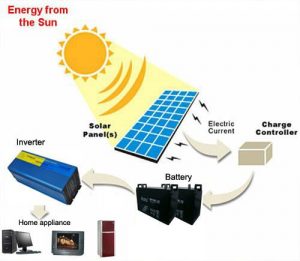
The effects of solar energy on the environment are wide-ranging and influential. Solar energy has the ability to reduce emissions, save water, and improve air quality.Solar panels also reduce the amount of energy that is required from fossil fuels to produce electricity, resulting in a smaller carbon footprint. With all of these benefits, it’s no wonder that solar power is becoming an increasingly popular renewable energy source. So, let’s move down the lane to know how does solar energy affect the environment.
Contents
How Solar Energy Reduces Emissions
The combustion of fossil fuels releases harmful greenhouse gases into the atmosphere, trapping heat and causing the Earth’s temperature to rise. This process is known as climate change, and it is responsible for a host of environmental problems including droughts, hurricanes, and floods. Solar power offers a clean and renewable alternative to fossil fuels that doesn’t contribute to climate change.

Solar photovoltaic (PV) systems convert sunlight into electricity without producing any emissions. In contrast, the generation of electricity from coal releases approximately 2,000 pounds of carbon dioxide into the atmosphere per megawatt hour (MWh). This means that a single PV system can avoid emitting tens of thousands of pounds of carbon dioxide every year.
Another way in which solar energy reduces emissions is by displacing the need for other forms of generation. For example, when a solar power plant is built in an area that otherwise would have relied on coal for electricity, emissions are reduced overall.
How Solar Energy Saves Water
Solar energy not only helps reduce emissions, but it also saves water. Thermoelectric power plants—which include Coal, Natural Gas, Nuclear, and Geothermal—withdraw large amounts of water from rivers, lakes, and aquifers to cool their facilities. The average coal-fired power plant withdraws enough water to fill an Olympic-sized swimming pool every three and a half minutes. In contrast, solar PV systems do not require water for cooling purposes and therefore have a much smaller water footprint.
Air Quality Improvements From Solar Energy
Solar energy also improves air quality by displacing other forms of generation that release harmful pollutants into the atmosphere. These pollutants can cause respiratory problems such as asthma and bronchitis, and have been linked to an increased risk of cancer. In 2015 alone, solar PV prevented the release of over 16 million metric tons of harmful air pollutants into the atmosphere. This was equivalent to taking 3.3 million cars off the road for an entire year!
The last words
solar energy is becoming an increasingly popular renewable energy source due to its ability to reduce emissions, save water,and improve air quality . These effects are wide-ranging and influential , making solar power a crucial component in the fight against climate change . As more people become aware of the environmental benefits of solar energy , it is sure to play an even more important role in years to come .







